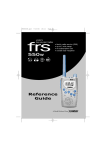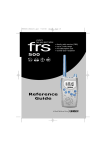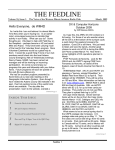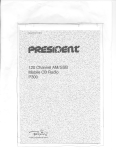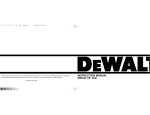Download Uniden frs 300 Two-Way Radio User Manual
Transcript
Cover 7/25/00 18:03 Page 1 FRS300.qxd 7/25/00 18:00 Page 100 Controls 1 2 4 3 6 5 7 8 9 10 1 2 3 4 5 6 7 Speaker jack Microphone jack on/off volume PTT button MON button LCD button 11 12 13 8 9 10 11 12 13 button Microphone call button scan button light button lock button FRS300.qxd 7/25/00 18:00 Page 101 FCC Information Important: Changes or modifications to this unit not expressly approved by Uniden could void your authority to operate this unit. Do not open your radio to make any internal adjustments. Your radio is set up to transmit a regulated signal on an assigned frequency. It is against the law to alter or adjust the settings inside the radio to exceed those limitations. Any adjustments to your radio must be made by qualified technicians using the proper test equipment. To be safe and sure: •Never open your radio’s case. •Never change or replace anything in your radio except the batteries. Your radio might cause TV or radio interference even when it is operating properly. To determine whether your radio is causing the interference, turn it off. If the interference goes away, your radio is causing it. Try to eliminate the interference by moving your radio away from the receiver. If you cannot eliminate the interference, the FCC requires that you stop using the radio. Audio Accessories: Do not operate the radio with audio accessories at high volume levels. Hearing experts advise against continuous high volume operation. If you experience a ringing in your ears, reduce the volume level or discontinue use. Always make sure the radio is turned off before plugging audio accessories into the accessory jack. Do not operate the radio in hazardous environments. Explosion or fire may result. Do not operate the radio near unshielded electrical blasting caps. Under certain conditions, radios can interfere with blasting operations and may cause an explosion. Turn your radio OFF to prevent accidental transmission when in a blasting area or in areas posted: “Turn off two-way radio.” Construction crews often use remote control RF devices to set off explosives. Care and Safety: To clean the radio, use a soft cloth dampened with water. Do not use cleaners or solvents because they can harm the body of the unit and leak inside, causing permanent damage. Use a dry, lint-free cloth to clean the battery contacts. This device complies with Part 15 of the FCC Rules. Operation is subject to the following two conditions: (1) this device may not cause interference, and (2) this device must accept any interference, including interference that may cause undesired operation of the device. FRS300.qxd 7/25/00 18:00 Page 1 Contents Welcome . . . . . . . . . . . . . . . . . . . . . . . . . . . . . . . . . . . . . . . 2 Included in Your Package . . . . . . . . . . . . . . . . . . . . . . . . . . 3 Battery Installation . . . . . . . . . . . . . . . . . . . . . . . . . . . . . . . 4 Low Battery Alert . . . . . . . . . . . . . . . . . . . . . . . . . . . . . . . . 5 Belt Clip . . . . . . . . . . . . . . . . . . . . . . . . . . . . . . . . . . . . . . . 5 Using Your Radio . . . . . . . . . . . . . . . . . . . . . . . . . . . . . . . . 6 •Turning the Radio On . . . . . . . . . . . . . . . . . . . . . . . . . . . 6 •Adjusting the Volume . . . . . . . . . . . . . . . . . . . . . . . . . . . . 6 •Choosing a Channel . . . . . . . . . . . . . . . . . . . . . . . . . . . . .7 •Scan Mode . . . . . . . . . . . . . . . . . . . . . . . . . . . . . . . . . . . .7 •Monitor Mode . . . . . . . . . . . . . . . . . . . . . . . . . . . . . . . . .8 •Talking on Your Radio . . . . . . . . . . . . . . . . . . . . . . . . . . . 8 •Locking In Your Selection . . . . . . . . . . . . . . . . . . . . . . . . . 9 •Call Tone Transmission . . . . . . . . . . . . . . . . . . . . . . . . . .9 •Silent Keypad . . . . . . . . . . . . . . . . . . . . . . . . . . . . . . . . .10 •LCD Backlight . . . . . . . . . . . . . . . . . . . . . . . . . . . . . . . . 10 •External Microphone and Speaker (Optional) . . . . . . . . . . .10 Troubleshooting . . . . . . . . . . . . . . . . . . . . . . . . . . . . . . . . 11 Specifications . . . . . . . . . . . . . . . . . . . . . . . . . . . . . . . . . . 12 Appendix - FCC Part 95 Subpart B . . . . . . . . . . . . . . . . . A-1 1 FRS300.qxd 7/25/00 18:00 Page 2 Welcome Congratulations on your purchase of the Uniden FRS300 family radio. This product is a lightweight, palm-sized radio you can carry almost anywhere. Use it at shopping malls, amusement parks, or sporting events to stay in contact with family and friends, or in a neighborhood watch for vital communications. This compact, state-of-the-art device is equipped with the following features: • 14 Preprogrammed Channels • Up to 2 mile range* • LCD Display • Tone Alert for incoming calls • Channel Scan • Keypad Lock • 50 hours of operation • Low Battery Level Indicator • LCD Backlit • Silent Keypad • External Speaker and Microphone Capable * Range may vary depending on environmental and/or topographical conditions. 2 FRS300.qxd 7/25/00 18:00 Page 3 Included in Your Package Your package contains the FRS300, this reference guide, and the accompanying belt clip with hardware. You will need to purchase three (3) AA ALKALINE batteries in order to operate the unit. If any of these items are missing or damaged, contact the Uniden Parts Department at (800)554-3988 M-F: 7:00 AM-5:00 PM CST. Belt clip and screws FRS Unit 3 FRS300.qxd 7/25/00 18:00 Page 4 Battery Installation Your FRS300 radio uses three (3) AA ALKALINE batteries for power. To install the batteries: 1. Make sure your radio is off. Do not mix old and new batteries to avoid damage to the unit. 2. Release the battery cover clip, then remove the battery cover. 3. Insert three (3) AA ALKALINE batteries according to the polarity symbols on the inside of the battery compartment. 4. Align the battery cover tabs with the FRS300 tab holes then replace the cover. 4 Tab holes FRS300.qxd 7/25/00 18:00 Page 5 Low Battery Alert The LCD on your radio shows a battery meter in the lower right corner. The icon indicates a fully powered unit. As the batteries become low, will flash. After 10 seconds, the channel number disappears. When the batteries in the unit are low, the unit will go into a Battery Low/Sleep Mode. The Scan Mode, Transmit, and Transmit Call Tone Mode are disabled. Replace the batteries immediately to continue using the radio. Belt Clip Because you will most likely use your radio when you are out and about, the unit comes equipped with a belt clip to fasten the unit to your belt, pocket, or purse. To remove the belt clip, turn the screws counterclockwise. To attach the belt clip: 1. Insert the belt clip screws into the slot on the belt clip. 2. Align the screws with the holes on the back of the radio and turn them clockwise, using a Phillips screwdriver to secure the belt clip. Do not over-tighten. 5 FRS300.qxd 7/25/00 18:00 Page 6 Using Your Radio To get the most out of your new radio, read this reference guide completely before attempting to operate the unit. Turning the Radio On 2 1 1. Turn the on/off volume control clockwise to turn the unit on. When you turn on your FRS300, the LCD backlight remains lit for 5 seconds. 2. Turn the control counterclockwise to turn the unit off. Adjusting the Volume 1. Press the MON button to hear background noise. The “BUSY” icon and icon appear. 2. Turn the on/off volume control clockwise to increase the volume and counterclockwise to decrease the volume. You may need to adjust the volume again when audio is heard from the speaker. 6 FRS300.qxd 7/25/00 18:00 Page 7 Choosing a Channel Your radio has 14 preprogrammed channels that you can use to talk to others. You must select the same channel as your party selected. To choose a channel for the FRS300: Press the ▲ or ▼ button repeatedly to select one of the 14 channels. (The number on the LCD changes to indicate that a new channel has been selected.) The BUSY icon and icon appear while receiving a transmission. Scan Mode Your radio also allows you to scan for activity from other transmitting radios. To use the Scan feature: 1. Press the scan button to begin scanning channels. The LCD will indicate that you are in scan mode. If a signal is present, the radio will stop on the active channel. It will remain on the channel until the transmission ends. After 2 seconds, it will resume scanning. 7 FRS300.qxd 7/25/00 18:00 Page 8 2. To resume scanning prior to the transmission end, press scan again. 3. Press the scan, call, PTT, ▲, or ▼ button to exit the scan mode, stopping at the current channel. If you press scan to exit the scan mode, the radio must be actively scanning. Monitor Mode The Monitor Mode is used to check activity on a specific channel. It will allow you to receive signals that are considered too weak. To check the channel activity: 1. Press and hold the MON button until you hear a series of beeps. You will hear background noise if the channel is clear. Don’t transmit if you hear conversation. 2. To turn the Monitor Mode off, press the MON button again. Talking on Your Radio To talk to others using the radio; 1. Determine your communicating channel with the other members of your party (refer to “Choosing a Channel” on page 7). 2. Press and hold the PTT button and speak into the microphone. The following LCD screen appears. 3. When you finish speaking, release the PTT button. You cannot hear any signals while your PTT button is pressed. 4. Repeat steps 2 and 3 to continue communication. 8 FRS300.qxd 7/25/00 18:00 Page 9 Locking In Your Selection To prevent the channel from accidentally being changed, you should lock the buttons of your FRS radio. This will disable the ▲, ▼, and scan keys. 1. Press and hold the lock button for two seconds to lock the buttons. The icon appears on the display indicating the buttons are locked. 2. Press and hold the lock button again for two seconds to unlock the buttons. Or turn the radio off and then on again to unlock the buttons. The call, on/off volume, PTT, MON, lock and light buttons will not be locked. Call Tone Transmission If you want to contact someone in your party, press the call button. ”CALL” and the transmit icon appear on the LCD for 2 seconds. Anyone on the same channel will be alerted with your Call Tone. 9 FRS300.qxd 7/25/00 18:00 Page 10 Silent Keypad A tone sounds when any button is pressed. This is the initial default setting. This function may be silenced if you wish. To silence the tones, press and hold the MON button while you turn on the radio. If you want to hear the tones again, press and hold the MON button while you turn on the radio. When the radio is turned off and then on again, the last selected setting remains. This function will also silence call tones and error tones. LCD Backlight The LCD display can be illuminated to assist your viewing. Press the light button to turn on the display backlight. The light goes off automatically after 5 seconds. External Microphone and Speaker (Optional) Available as an optional accessory. Use only an original Uniden speaker/microphone. Use of any other speaker/microphone may void your warranty. To purchase your external accessory, contact your local Uniden dealer or call Customer Service at (800) 297-1023 Monday through Friday, 7:00 a.m. to 7:00 p.m. Central time. 10 FRS300.qxd 7/25/00 18:00 Page 11 Troubleshooting Problem Solution No power Message not transmitted • Reposition or replace batteries. • Make sure the PTT button is completely pressed as you transmit. • Reposition or replace batteries. • Confirm radios have the same channel. • Make sure PTT is not inadvertently being pressed. • Reposition or replace batteries. • Obstructions, operating indoors or in vehicles may interfere with communication. Change your location. • Check to make sure volume is turned up. • Street/concrete structures, heavy foliage and use in buildings and in vehicles will decrease the range. Check for clear line of sight to improve transmission. • Wearing the radio close to the body, such as in pocket or on a belt will decrease range. Change the location of radio. • Radios are too close. Radios must be at least 5 feet apart. Increase your distance. • Radios are too far apart. Obstacles interfere with transmission. Talk range is up to 2 miles in clear, unobstructed conditions. Message not received Limited talk range Heavy static or interference If after trying these simple steps, your unit still does not function properly, call Uniden Customer Service at (800)297-1023 Monday through Friday, 7 a.m. to 7 p.m. Central time. 11 FRS300.qxd 7/25/00 18:00 Page 12 Specifications Description Channels Operating Frequency Talk range Power Source Transmit Power Out Battery Life 14 UHF - 462.550 to 467.725 MHz Up to 2 Miles 3AA Alkaline Batteries 500m W 50 Hours typ. (5/5/90 duty cycle) Channel Frequency Chart (MHz) Channel 1 2 3 4 5 12 Frequency 462.5625 462.5875 462.6125 462.6375 462.6625 Channel 6 7 8 9 10 Frequency 462.6875 462.7125 467.5625 467.5875 467.6125 Channel 11 12 13 14 Frequency 467.6375 467.6625 467.6875 467.7125 FRS300.qxd 7/25/00 18:00 Page 13 Appendix - FRS Radio Rules FCC Part 95 Subpart B §95.191 (FRS Rule 1) Eligibility and responsibility. (a) Unless you are a representative of a foreign government, you are authorized by this rule to operate an FCC certified FRS unit in accordance with the rules in this subpart. No license will be issued. (b) You are responsible for all communications that you make with the FRS unit. You must share each channel with other users. No channel is available for the private or exclusive use of any user. §95.192 (FRS Rule 2) Authorized locations. (a) Provided that you comply with these rules, you are authorized to operate an FRS unit: (3) Aboard any vessel or aircraft registered in the United States, with the permission of the captain, that is within or over any area of the world where radio services are regulated by the FCC or upon or over international waters; (4) Aboard any unregistered vessel or aircraft owned or operated by a United States citizen or company that is within or over any area of the world where radio services are regulated by the FCC or upon or over international waters. (5) You must operate the FRS unit only according to any applicable treaty to which the United States is a party. The FCC will make public notice of any such conditions. (b) [Reserved] (1) Within or over any area of the world where radio services are regulated by the FCC (this area includes the fifty United States and the District of Columbia, the Commonwealth of Puerto Rico, the United States Virgin Islands (50 islets and cays), American Samoa (seven islands), the Commonwealth of Northern Marianna Islands, and Guam Island); (2) Within or over any other area of the world, except within or over the territorial limits of areas where radio services are regulated by an agency of the United States other than the FCC or any foreign government (you are subject to its rules); (c) [Reserved] (d) Anyone intending to operate an FRS unit on the islands of Puerto Rico, Desecheo, Mona, Vieques, and Culebra in a manner that could pose an interference threat to the Arecibo Observatory shall notify the Interference Office, Arecibo Observatory, Post Office Box 995, Arecibo, Puerto Rico 00613, in writing or electronically, of the location of the unit. Operators may wish to consult interference guidelines, which will be provided by Cornell University. Operators who choose to transmit information electronically should e-mail to: [email protected]. A-1 FRS300.qxd 7/25/00 18:00 Page 14 (1) The notification to the Interference Office, Arecibo Observatory shall be made 45 days prior to commencing operation of the unit. The notification shall state the geographical coordinates of the unit. (2) After receipt of such notifications, the Commission will allow the Arecibo Observatory a period of 20 days for comments or objections. The operator will be required to make reasonable efforts in order to resolve or mitigate any potential interference problem with the Arecibo Observatory. If the Commission determines that an operator has satisfied its responsibility to make reasonable efforts to protect the Observatory from interference, the unit may be allowed to operate. §95.193 (FRS Rule 3) Types of communications. (a) You may use an FRS unit to conduct two-way voice communications with another person. You may use the FRS unit to transmit one-way communications only to establish communications with another person, send an emergency message, provide traveler assistance, make a voice page, or to conduct a brief test. (b) The FRS unit may transmit tones to make contact or to continue communications with a particular FRS unit. If the tone is audible (more than 300 Hertz), it must last no longer than 15 seconds at one time. If the tone is subaudible (300 Hertz or less), it may be A-2 transmitted continuously only while you are talking. (c) You must not use an FRS unit in connection with any activity which is against federal, state or local law. (d) You must, at all times and on all channels, give priority to emergency communication messages concerning the immediate safety of life or the immediate protection of property. (e) No FRS unit may be interconnected to the public switched network. §95.194 (FRS Rule 4) FRS units. (a) You may only use an FCC certified FRS unit. (You can identify an FCC certified FRS unit by the label placed on it by the manufacturer.) (b) You must not make, or have made, any internal modification to an FRS unit. Any internal modification cancels the FCC certification and voids your authority to operate the unit in the FRS. (c) You may not attach any antenna, power amplifier, or other apparatus to an FRS unit that has not been FCC certified as part of that FRS unit. There are no exceptions to this rule and attaching any such apparatus to a FRS unit cancels the FCC certification and voids everyone's authority to operate the unit in the FRS. FRS300.qxd 7/25/00 Memo 18:00 Page 17 FRS300.qxd 7/25/00 18:00 Page 15 © 2000 Uniden America Corporation All rights reserved • Printed in China UTZZ01874ZZ Covered under one or more of the following U.S. patents: 4,398,304 4,627,100 5,199,109 5,471,660 5,530,296 4,409,688 4,841,302 5,408,692 5,483,684 5,574,995 4,455,679 4,888,815 5,428,826 5,548,832 5,577,076 4,461,036 4,932,074 5,438,688 5,551,071 5,598,430 4,521,915 4,947,456 5,448,256 5,642,424 5,600,223 4,597,104 5,014,348 5,465,402 5,710,992



















